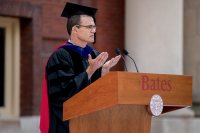
AACU president to speak at convocation
Carol Geary Schneider, president of the Association of American Colleges and Universities (AACU), will discuss Liberal Learning and the Engaged Academy during convocation celebrating the 144th academic year at Bates College Wednesday, Sept. 9, at 4 p.m. on Coram Library quadrangle.
Bates President Donald W. Harward; Ann Scott, Dana Professor of Music and acting dean of the faculty; and Carrie Delmore, a junior from Wolfeboro Falls, N.H., and president of the student-run Representative Assembly, also will speak.
In the event of rain, convocation will be held in Alumni Gymnasium. Returning students will see several campus improvements as a result of summer construction projects. The $18-million new Academic Building, slated for opening in fall 1999, has been entirely framed and structural masonry has been completed. The Lake Andrews restoration project, including water and shoreline improvements, as well as a new amphitheater near the Olin Arts Center, is nearly finished. The George and Helen Ladd Library, closed since May 26, 1998, for renovations, now features a new current periodicals and microforms area, new study-group rooms, new carpet and paint, expanded seating capacity and new stairway access to the library terrace.
Schneider’s early studies of religious and political dissent in the early modern period, with special emphasis on transatlantic Puritanism, have evolved into her current interests in cultural and democratic pluralism and the intersection of cultural idea s and values with social and political developments. She is co-author with Robert Schoenberg of “Contemporary Understandings of Liberal Education,” the first discussion paper in a new AACU series on “The Academy in Transition.”
Schneider graduated magna cum laude from Mount Holyoke College with a bachelor’s degree in history and membership in Phi Beta Kappa. She studied at the University of London’s Institute for Historical Research and earned a Ph.D. in history from Harvard University, were she had a Woodrow Wilson Fellowship, a Kent Fellowship and a Harvard Prize Fellowship. In 1982, she was named a Mina Shaughnessy Fellow of the U.S. Department of Education.
While serving as executive vice president of AACU in 1997, Schneider directed “Engaging Cultural Legacies,” a collaboration of 65 colleges and universities to incorporate global and intercultural perspectives into curriculums, supported by the National Endowment for the Humanities. She also has directed the AACU’s American Commitments initiative, focusing on the core connections among liberal education, engagement with societal and intellectual diversity and a commitment to democratic principles.
Schneider has worked closely with President Clinton’s Race Relations Initiative, encouraging campuses to support the national conversation on race through local diversity projects. She has taught in interdisciplinary programs at Boston University, DePaul University and the University of Chicago. She also has contributed to curriculum transformation efforts in South Africa and recently served as a distinguished visiting scholar at the American University in Cairo.
The college expects approximately 1,660 undergraduates for the 1998 fall semester, including an estimated 451 new students. In spite of growing competition among colleges for a shrinking pool of students, Bates College, ranked among the top 20 national liberal arts colleges by a recent U.S. News and World Report, continues to attract an increasing number of candidates. Approximately 3,615 high school students applied for a place in the college’s class of 2002, which features students from 37 states and 1 7 countries. Scholastically, 32.5 percent of the class ranked within the top five percent of their high school graduating class, and 55 percent ranked in the top 10 percent of their high school graduating class.



